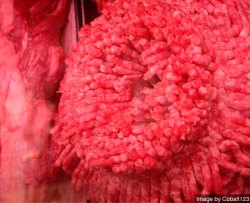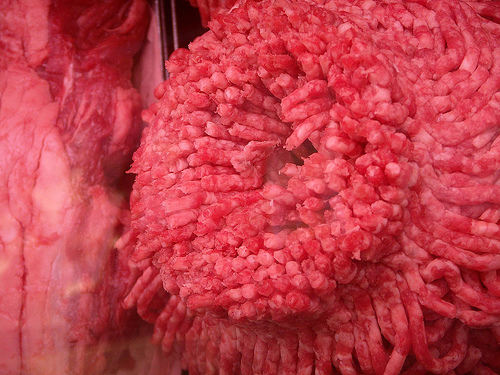
Cobalt123
I would probably be bitter, too, if I were Beef Products, Inc. Those are the folks behind uber-gross “lean finely textured beef,” aka “pink slime,” the ammonia-soaked cow trimmings added as filler to ground beef. During pink slime’s heyday, it ended up in more than two-thirds of American hamburgers, at a ratio of up to 15 percent slime to 85 percent burger. That slime was cheap, and so chemical-packed that it sterilized the rest of the meat. Mmm, food!
Fast-forward to today: The origins and grossness of “pink slime” are well-known, fast food restaurants have given up the stuff, and BPI is as pissed as a parent whose kid was unknowingly served pink slime in her USDA-approved school lunches.
According to TIME, only about 5 percent of ground beef contains the “lean finely textured” stuff now. Following an 11-part ABC News series that ran last March and April, BPI says its revenues have dropped from more than $650 million a year to $130 million. The company filed a lawsuit last September against ABC, anchor Diane Sawyer, and other named defendants seeking $1.2 billion in damages. ABC didn’t coin “pink slime” — a USDA scientist named Gerald Zirnstein did, in 2002 — but ABC and its parent company Disney sure do have deep pockets.
BPI has hired “a high-powered Chicago trial lawyer,” according to Reuters, which reports the case “is shaping up to be one of the most high-stakes defamation court battles in U.S. history.” The company’s founders say they plan to fight ’til the bitter, slimy end, regardless of the cost. “We have to do this,” one told Reuters. “We have no other choice.”
The case hinges on state “product-disparagement” statutes that protect farmers and their products in 13 states, including South Dakota, where BPI is based. From Reuters:
Under the South Dakota version of the law, plaintiffs must show that defendants publicly spread information they knew to be false and stated or implied “that an agricultural food product is not safe for consumption by the public.” …
For BPI to prove the defamation piece of its case, it would need to show that the network negligently reported a false statement of fact that injured its reputation. If BPI is deemed by the court to be a public rather than a private figure in the legal sense, it would have a higher bar to cross: The company would need to prove ABC knew the facts it was reporting were false or it recklessly disregarded the truth.
While the case is in the early stages, the network appears to have a legal leg-up on both counts: ABC never said BPI’s product is dangerous, and courts have repeatedly offered broad protections for journalists in the course of their work.
But by calling a food product “slime” 137 times over the span of nearly four weeks on its newscasts, its website and on Twitter, according to BPI’s tally, did ABC make the public think [lean finely textured beef] was unsafe? If, as BPI alleges, ABC shrugged off information that refuted parts of its reporting, did it act recklessly and could it therefore be held liable for defamation?
The case will be one of the first challenging First Amendment protections for news outlets in the social media era. One notable piece of evidence cited in BPI’s lawsuit is a single Tweet by reporter Jim Avila, who wrote: “It’s just not what it purports to be. Meat.” One of BPI’s arguments is that ABC News intentionally portrayed its product as something other than beef. (The USDA considers [lean finely textured beef] to be beef.)
If BPI wins, the precedent would be chilling for reporting on industrial food. If ABC wins, we probably still won’t see a lot of investigative reporting on industrial food, honestly. And either way, we’ll still have the slime: After a steep dropoff last year, manufacturers are slowly reintroducing the stuff.




